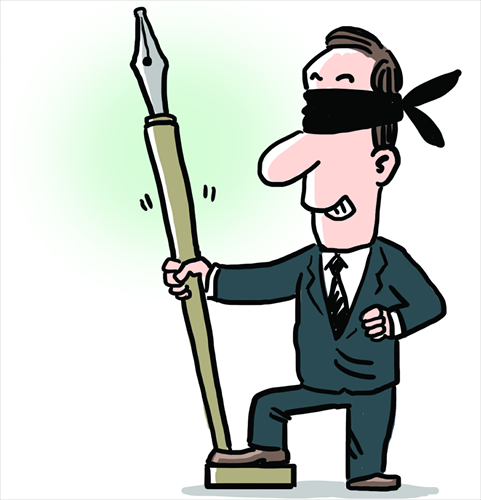HOME >> OP-ED
Falsely attributed comments are aimed at making online splash
By Rong Xiaoqing Source:Global Times Published: 2014-6-26 19:08:01

Illustration: Liu Rui/GT
Some of them were forwarded to me via email. Some of them were posted in Wechat by my friends. It happens so often these days that if I don't see one for a few days I feel like I might have missed something.They are articles full of critical comments about Chinese society, Chinese culture, or the Chinese people, and they either have bold bylines from people like Gary Locke, former US ambassador to China or even Confucius himself, and are often dramatically associated with an occasion. It is hard to ignore them.
But a few paragraphs through, a reader will likely tell that they are fishy.
For example, a checklist of the characteristics of the Chinese people that is said to be from Locke and has been circulating broadly among Chinese netizens includes lines like: "They like criticizing others but seldom check themselves," and "They don't care whether they themselves are happy but they don't want other people to be happy."
One article was said to be the transcript of a speech by former US secretary of state Hillary Clinton at Harvard University, which claimed that China would be the poorest country in the world in 20 years. And the reasons the author offered include: "Some 90 percent of families of the high-ranking officials and 80 percent of rich people have either applied for immigration to other countries or are planning to do so. It's hard to understand why the ruling class and the elite group that benefit the most have no confidence in their country," and " China is one of the few countries in the world where people don't have faith. The only thing the entire country believes in is money and power. People are selfish."
Another piece includes newly discovered last words from Confucius. He is supposed to have told his disciples: "Those who want to be the ruler have to be good at using the people. When the people are dumb, the nation is stable. When the people are smart, there will be chaos," and "The best way to control people is to control their minds."
Among the group are also several essays said to be works of students in the writing test of the recent national college entrance exams that either got a zero score or a full score because they outraged or awed the judges. These essays mainly offered sarcastic comments on urgent issues in China such as food safety and air pollution.
All of these posts look quite sophisticated with either the picture of the supposed authors or the exact headlines printed in the writing test. And the piece associated with Confucius was even written in the ancient style with a matching translation in modern Chinese.
Nevertheless, their authenticity is as flimsy as gauze. Forget the high school students who dared to risk their once-in-a-lifetime opportunity for higher education by ranting in their essays. Forget Confucius who sounds like a sarcastic modern dissident. If Locke and Clinton really said the words quoted above, there certainly would have been diplomatic skirmishes between China and the US.
These names and high-profile occasions were simply borrowed by those who want to gain more attention for their messages.
Some may think this can be explained by the oppression of freedom of speech in China; people who don't want to risk getting into trouble for criticizing the country have to put their words on the tongues of those who cannot be touched. But this explanation at best has oversimplified the situation.
With the Internet pushing the boundaries further, the opinions in these articles are no longer unavailable in today's China. Indeed similar candid comments are ubiquitous on the Internet. But many attract little attention because of their ubiquity.
So the new phenomenon is a challenge from freedom of speech: To be able to say something and to be able to get an audience are two different things.
There is an unfortunate hierarchy that dominates the Op-Ed arena in society. Many times what is said is much less important than who said it. Power, money and smart strategies, which are available at the finger tips of power and money, can play a major role in manipulating an audience.
Take a look at the way the Sunni jihadists in Iraq are getting attention for the combination of brutality, power and even sick humor that they have been able to portray in videos and other postings as they have trolled through towns and cities. They have been getting a lot more attention than, say, people battling genocide and famine in African countries.
In a world where everyone can say whatever he or she likes, it could be hard to get your voice heard, if not harder.
The author is a New York-based journalist. rong_xiaoqing@hotmail.com
Posted in: Columnists, Viewpoint, Rong Xiaoqing